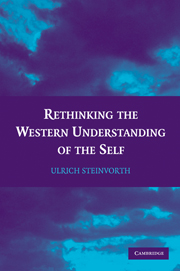Book contents
- Frontmatter
- Contents
- Preface
- Part I Introduction
- Part II Basics of Philosophical Psychology
- Chapter 2 Heideggerian and Cartesian Self
- Chapter 3 Free Will
- Chapter 4 Cartesian, Lockean, and Kantian Self
- Chapter 5 Extraordinariness and the Two Stages of Rationality
- Part III The Cartesian Self in History
- Part IV Value Spheres
- Part V A Self-Understanding Not Only for the West
- Select Bibliography
- Index
Chapter 4 - Cartesian, Lockean, and Kantian Self
Published online by Cambridge University Press: 05 June 2012
- Frontmatter
- Contents
- Preface
- Part I Introduction
- Part II Basics of Philosophical Psychology
- Chapter 2 Heideggerian and Cartesian Self
- Chapter 3 Free Will
- Chapter 4 Cartesian, Lockean, and Kantian Self
- Chapter 5 Extraordinariness and the Two Stages of Rationality
- Part III The Cartesian Self in History
- Part IV Value Spheres
- Part V A Self-Understanding Not Only for the West
- Select Bibliography
- Index
Summary
Liberated from descartes's dualism, the cartesian conception of the self has the virtue of identifying the self with a capability. The Cartesian self is the capability of deliberate judgment; it is the individual considered in her capacity of judging, more exactly of acting by judging and preparing judgment. By definition, it, or we considered in this capacity, do not suffer or feel, as far as feeling is a passion without judgment (sometimes it includes judgment). What we suffer is something happening to us and therefore not part of the self. The self is constituted only by judging and by examining thoughts and feelings to determine whether they are to be accepted or rejected. Such examining is thinking. Thoughts in the sense of inspirations or ideas are different from the action of examining them; it is only such examination that I call thinking. Like passions and (nonjudging) feelings, thoughts (in distinction from thinking) are objects of the self, not its constituents. They belong to the subject. The self experiences them; or else it could not judge them. Nevertheless, it is not the experiencing of the subject that defines the self, but only our capacity of judging. Let's never forget that it is only the individual, the whole of self and subject, who acts and feels, not the self and the subject, although I often say so to mark out that the individual acts by her self and not her subject.
- Type
- Chapter
- Information
- Rethinking the Western Understanding of the Self , pp. 37 - 47Publisher: Cambridge University PressPrint publication year: 2009

